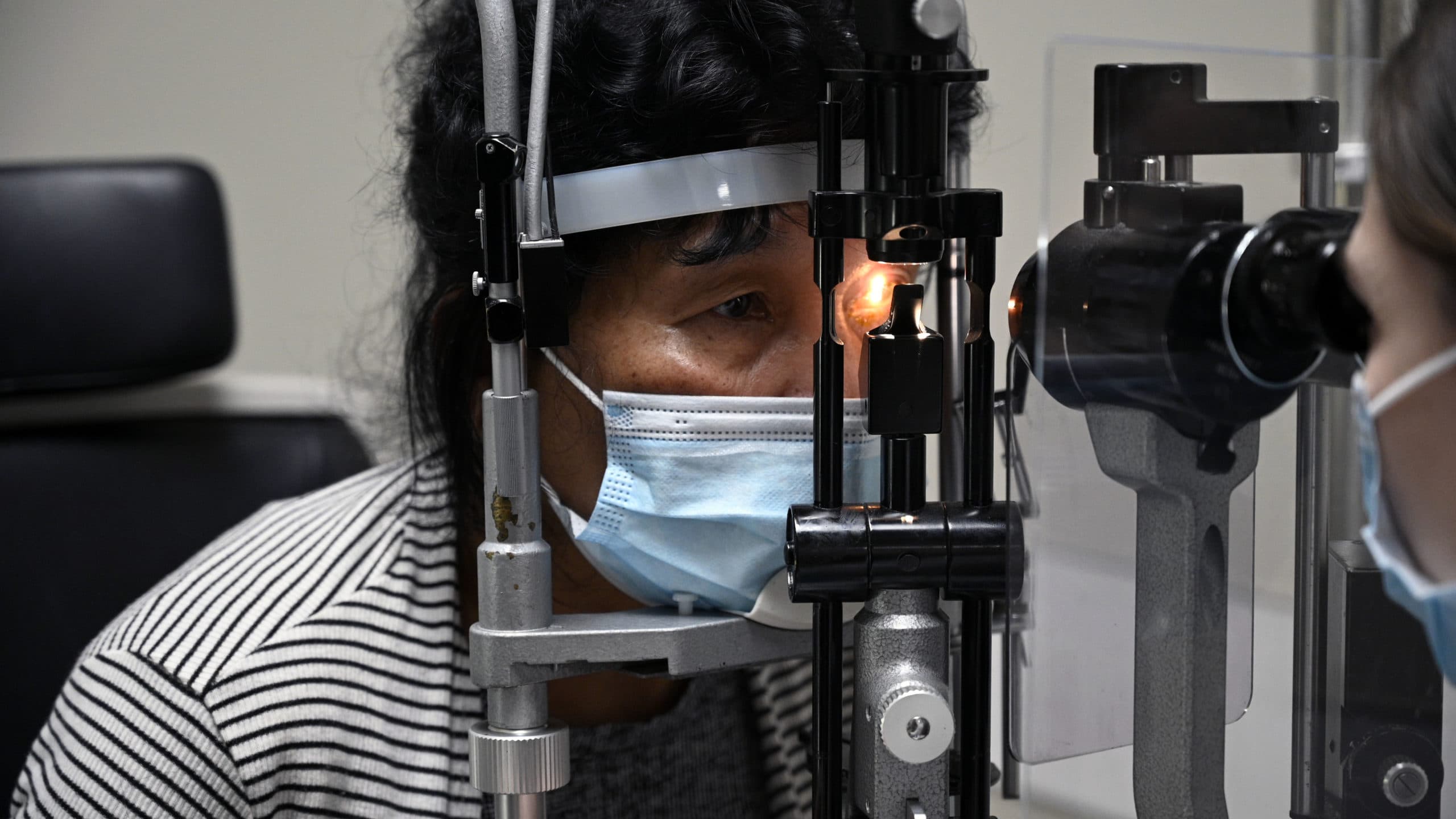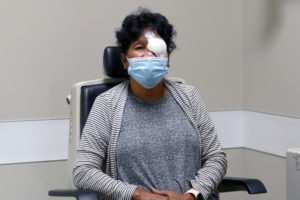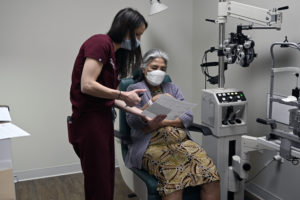UAMS Restores Vision and Hope for 21 Marshallese Patients
| Libos Gold suffered from cataracts so severe that she couldn’t see her loved ones or even the food on her plate, but after undergoing cataract surgery at the University of Arkansas for Medical Sciences (UAMS), she says her vision is now “very clear.”
The Harvey & Bernice Jones Eye Institute at UAMS hosted “The Gift of Sight” on April 24 to perform cataract surgery for 21 Marshallese patients from Northwest Arkansas. Surgeries, transportation and food were provided at no cost to the patients, thanks to generous donations from anonymous donors and community partners, including Alcon, the Henry Eye Clinic in Fayetteville and Plating Change-Trio’s Restaurant.

Joseph Sanford, M.D., explains the anesthesiology process to a patient before surgery as Likkien Ralpho translates.
Northwest Arkansas is home to the largest Marshallese population in the country after many citizens from the Marshall Islands migrated to the United States, beginning in the 1950s. Their legal migration occurred after the U.S. detonated more than 65 nuclear test bombs that destroyed some of their islands and ecosystems.
Gold, 60, relocated from the Marshall Islands to Springdale in 2000. She worked as a custodian for the school district, but her cataracts affected her ability to work. And just like many other native Islanders in Northwest Arkansas, her inability to see impacted her overall quality of life.
“I couldn’t see anything. I had to feel around for everything,” Gold said with the help of a translator. “I had to feel around my plate to know what I was eating.”
She began going to the North Street Marshallese Clinic, part of the UAMS Neighborhood Clinic – North Street in Fayetteville. In 2014, the UAMS Northwest Regional Campus developed an initiative to provide a free clinic for their Marshallese neighbors, and in the process, they discovered many Marshallese patients had cataracts but lacked the means for sight-correcting surgery.
“Although they legally live and work in the United States, their limited access to health care in the past has resulted in many disorders, some of which are treatable, including cataracts that cause limited vision and blindness,” said Paul Phillips, M.D., Eye Institute director and UAMS chair of ophthalmology. “You normally don’t see cataracts this severe in the United States.”
A cataract causes the lens of an eye to become cloudy, eventually leading to vision issues or blindness. Cataract surgery removes the cloudy lens and usually replaces it with a clear, artificial lens. The surgery typically takes just less than 30 minutes but costs thousands of dollars without insurance, Phillips said.
Noticing the severe need for cataract surgery, the two UAMS campuses worked with Marshallese Arkansans and reached out to community partners to raise funding for the surgeries that changed the lives of their Marshallese neighbors.
While the surgeries were performed in Little Rock, patients traveled back to Fayetteville to have their eye patches removed at the Henry Eye Clinic the following day. And for the first time in years, the patients could see again.
“My vision is very clear. I’m very, very happy, and I’m very thankful to God and for Team UAMS. I want to thank the doctor who performed the surgery because I feel great. One thing I really want to do is just go out and see things and go shopping,” Gold said as she laughed.

Clinical interpreter Lynda Riklon translates after-care instructions for Marshallese patients at Henry Eye Clinic in Fayetteville.
She added, “I’m going to go out there and be an advocate for Team UAMS and tell people what they’ve done.”
Alongside Phillips, the event was organized by Sheena CarlLee, M.D.; Thomas Schulz, M.D.; Sheldon Riklon, M.D.; Linda Worley, M.D.; Stacia Dean, RN; and community health workers Lynda Riklon and Terry Takamaru.
Lynda Riklon and Terry Takamaru, in addition to staff at the Community Clinic NWA and Primrose Jones, M.A., helped identify patients in need of the cataract surgery and provided assistance with translation, patient education and logistics. They said many of their fellow Marshallese community members have already reached out to them, as news of the surgeries began traveling quickly.
“This means a lot to the patients and their families. Some of them have been visually impaired for a while and being able to see again brings them so much joy and happiness. The patients are back to their normal lives and are able to do things that they missed doing together with their families,” said Riklon, a UAMS Northwest Regional Campus clinical interpreter. “One of the patients had tears of joy as she was leaving the clinic. She wasn’t able to see her husband’s face for three years, and today she was so happy to see him.”
Several UAMS community health workers also assisted as interpreters, including Justina Joel, Merely Mack, Winnie Milne, Morda Netwon, Likey Ralpho, Likkien Ralpho, Amy Riklon, Joeleen Riklon and Frailan Riklon.
To prepare for surgery, Joseph Chacko, M.D.; Carina Sanvicente, M.D.; Eugenia White, M.D.; and Kinza Ahmad, M.D., from UAMS traveled to Fayetteville to perform the pre-operative examinations. Paul Henry, M.D.; Craig Brown, M.D.; and staff from the Henry Eye Clinic also volunteered their services and equipment for pre-operative and post-operative exams.
“This is what being a health care professional is all about. Patients were elated to see that their vision was restored,” said Sanvicente, an assistant professor in the UAMS Department of Ophthalmology in the College of Medicine who performed many of the surgeries. “This event was a great example of what it truly means to serve the community.”
In addition to Chacko, Sanvicente, Fong, Ahmad, the UAMS physicians and staff volunteering their time to perform and assist with surgeries include David Warner, M.D.; Romona Davis, M.D.; Sami Uwaydat, M.D.; Ahmed Sallam, M.D.; Riley Sanders, M.D.; and Steven Edens, M.D. Jason Holt, RN; Patrick Cheng, RN.; Lavonia Walker, RN; and Tammy Jones, Ph.D., RN, volunteered nursing support. Alvin Stewart, M.D., and his staff volunteered anesthesia services.
The Eye Institute hopes to have another “Gift of Sight” event in the next few months.


